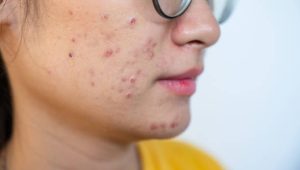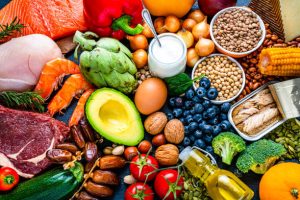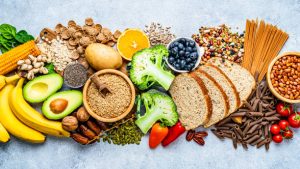From the depths of anecdotal whispers to the peaks of scientific scrutiny, the interplay between diet and acne has been a subject of fascination and debate. With each bite, individuals hold out hope that their choices at the table may also heal their skin. This article strives not only to inform but also to illuminate, traversing through the historical narratives, modern research, and the nuanced relationship between nourishment and our skin’s well-being.
Historical Insight: Diet’s Role in Acne Explored
Contents
- 1 Historical Insight: Diet’s Role in Acne Explored
- 2 Understanding Acne: More Than Skin Deep
- 3 Poring Over Research: Diet’s Impact Studied
- 4 Dietary Players: What Foods to Watch
- 5 Myth-Busting: Sorting Fact from Fiction
- 6 Nutritional Nuggets: Diet’s Potential Skin Benefits
- 7 Making the Shift: Diet-Induced Dermatological Change
- 8 Considerations in the Crucible of Research
- 9 Balancing Diet and Skin Care

During time’s passage, the theories surrounding acne have morphed as dramatically as our diets themselves. Historically, foods rich in fats and sugars were often maligned as pimple-prompting culprits. This view was so pervasive that generations grew up shunning chocolates and chips, fearing the eruption of unsightly skin lesions. Yet, as our understanding of nutrition and dermatology deepened, these simplicities began to unravel, giving way to a far more complex portrait of acne’s etiology.
The notion that diet influences acne is not newfound; it springs from centuries of observations and hypotheses. Early dermatological literature abounds with references to dietary excess as a skin sin, connecting indulgence at the dinner table to the punishment of blemishes. As the scientific paradigm shifted, these assertions were subjected to the unforgiving glare of evidence-based scrutiny. Through countless studies and experiments, the monolithic narrative of ‘food as foe’ began to crumble.
We stand now at the cusp of a renaissance in acne insight, looking back at our food-related follies with a mix of amusement and enlightenment. While the sins of the past are forgiven, the wisdom gained informs our present journey through the rocky terrain of acne’s true triggers. This evolution of opinion asks for an engagement with science and the patience to understand acne’s many muses, including the foods we cherish.
Understanding Acne: More Than Skin Deep

Acne is a testament to the complexity of human biology; a dance of hormones, genetics, and environment played out across the canvas of our skin. While often dismissed as a trivial adolescent trial, its reach spans age groups, leaving few untouched by its unpredictable onset. This condition is not a mere cosmetic inconvenience—it’s a dermatological defiance that can deeply affect self-esteem and cause lasting scars both emotionally and physically.
The root of acne lies in the pilosebaceous unit, where hair follicles and oil glands congregate. When pores clog with an overproduction of sebum and a build-up of dead skin cells, the stage is set for inflammation and bacterial growth. It’s a perfect storm where Propionibacterium acnes, the bacteria involved in acne, thrives, leading to the red, swollen lesions that characterize this condition.
Crucially, acne is an individualistic affliction. What erupts on one person’s skin may not mirror another’s experience, making the journey towards clear skin deeply personal. This variability is also reflected in the way diet affects acne. For some, eating certain foods seems to exacerbate their skin woes, while others enjoy a broader dietary freedom without dermatological reprisal. It is this individual complexity that urges a nuanced approach in understanding and tackling acne.
Poring Over Research: Diet’s Impact Studied

The pursuit of a scientific consensus on diet and acne has been nothing short of an odyssey. Sifting through the myriad studies, it becomes evident that meticulous research has replaced old wives’ tales, providing a clearer picture of how our meals may manifest on our skin. From glycemic loads to dairy deliberations, researchers have dissected dietary elements to unveil their connections to acne.
Central to this debate has been the link with diets high in glycemic index (GI)—a measure of how quickly blood sugar levels rise after eating certain foods. Studies suggest that foods prompting a rapid increase in insulin can exacerbate acne by influencing the hormonal pathways that stimulate oil production. These high-GI foods, often processed and sugary treats, have emerged as perpetrators in acne’s persistence in some individuals.
Conjointly, dairy has faced scrutiny within the scientific arena. Multiple studies propose a relationship between milk consumption and acne prevalence, potentially due to hormones present in milk. However, the dairy discourse is dappled with controversies and contradictions, underscoring the challenge of discerning diet’s precise role in acne. Despite earnest explorations, the scientific voyage towards unequivocal answers continues, navigating through a sea of variables with no absolute horizon in sight.
Dietary Players: What Foods to Watch

In navigating the tangled web of acne triggers, certain foods have come under the spotlight more than others. Here’s a simple breakdown to decipher which dietary elements may deserve attention:
High-Glycemic Foods:
- White bread
- Pastries and cakes
- Sugary drinks
Dairy Products:
- Milk, particularly skim milk
- Cheese
- Ice cream
- Omega-6 Fatty Acids (Found in some oils and processed snacks)
While not exhaustive, this list encapsulates the primary suspects in the diet-acne lineup. It’s important to remember that correlation does not imply causation; just because a food is listed does not mean it will cause acne in every individual. Furthermore, it’s crucial to maintain a balanced perspective, considering whole dietary patterns rather than isolating specific foods.
Myth-Busting: Sorting Fact from Fiction

Amidst the clamor surrounding acne and diet, myths proliferate with the perseverance of pimple itself. It’s time to address and dismantle some of these enduring myths:
- Myth: Eating greasy food directly leads to oily skin and acne.
- Myth: Chocolate binges are a clear recipe for acne breakouts.
- Myth: Poor hygiene, not diet, is the sole cause of acne.
These oversimplifications ignore the intricate interplay of genetics, hormones, and lifestyle factors that contribute to acne. It’s essential to sift through the misconceptions with a critical mind and a trust in evidence over hearsay. Empowered with accurate information, individuals can make informed choices about their diets with a clearer understanding of what may or may not influence their skin.
Nutritional Nuggets: Diet’s Potential Skin Benefits

Beyond the well-tread territory of dietary don’ts, nutrition presents a landscape lush with potentials for improved skin health. As science peels back the layers of dietary influence, it reveals gems that may aid in the fight against acne:
Antioxidant-Rich Fruits and Vegetables:
- Berries
- Dark leafy greens
- Brightly colored peppers
Foods with Omega-3 Fatty Acids:
- Fatty fish (like salmon and mackerel)
- Flaxseeds
- Walnuts
Low-Glycemic Index Foods:
- Whole grains
- Legumes
- Nuts and seeds
In embracing these foods, we nourish our bodies with the materials necessary for robust skin health. Antioxidants combat oxidative stress, omega-3s may reduce inflammation, and low-GI foods help stabilize insulin levels, offering a trifecta of support for acne-prone skin. This proactive approach to diet emphasizes the positive partnerships between our plates and our pores.
Making the Shift: Diet-Induced Dermatological Change

For those seeking solace from the grips of acne through dietary adjustment, there are practical changes to consider:
- Gradual Replacements: Swap out high-GI snacks for whole food alternatives, emphasizing an incremental change rather than an overwhelming overhaul.
- Dairy Diligence: If suspecting dairy as a skin disruptor, trial periods of reduced intake could illuminate its impact on your acne.
- Hydration and Fiber: Prioritize water intake and fiber-rich foods to support digestion and toxin elimination, which may contribute to clearer skin.
These suggestions reflect a pragmatic and customizable approach to dietary modification in the context of acne management. It’s a personal experiment, one where observation and adaptation are key. Again, these steps should complement, not replace, the guidance from healthcare professionals to ensure a holistic and effective acne strategy.
Considerations in the Crucible of Research

Delving into the diet-acne discourse requires an acknowledgement of the subtleties and shortcomings within the field. Research on the subject is vibrant yet vexed by variables such as differing genetic backgrounds, dietary habits, and lifestyles. These factors convolute the clarity of conclusions and highlight a need for cautious interpretation of findings.
Moreover, food is but one facet of a multifaceted condition. Environmental factors, stress levels, and skincare routines also play pivotal roles in acne’s intricacy. Emphasizing diet alone as the beacon of blame does a disservice to the holistic nature of skin health and acne’s true complexity.
As such, a balance must be struck between taking research into account and appreciating its current limitations. Vigilance in understanding the nuances of studies, and a resistance to jumping to sweeping conclusions, form the foundation of a reasoned and rational approach to acne management involving dietary elements.
Balancing Diet and Skin Care

In summary, science gestures towards a conceivable link between diet and acne, though not without caution. Recognizing this link as part of a broader health narrative is vital, appreciating that a multifaceted condition demands a multifaceted response. Dietary adjustment, while potentially beneficial, should complement other treatments and lifestyle modifications rather than solely bearing the burden of clear skin aspirations.
As we embrace a balanced view of acne, we empower ourselves to face it with a blend of wisdom and patience. The lessons learned journeying through scientific landscapes can guide us, but the map is not yet complete. Each step forward is a step toward understanding, and with understanding comes the power to heal, both inside and out.

